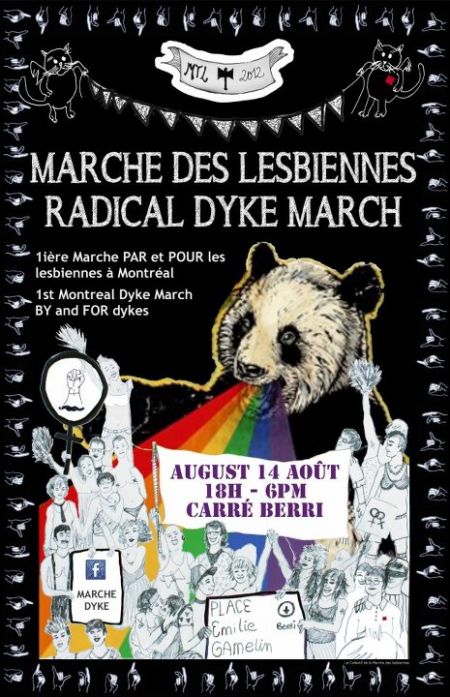Dykes of all backgrounds will walk through the streets of Montreal together tonight. The first annual Montreal Radical Dyke March will kick off at 6pm at Place Émilie-Gamelin.
While Dyke Marches have been taking place in cities around the world since 1993, Montreal may be lagging behind–but the event has also been a long time in the works.
According to Barbara Legault, one of the organizers, people have been talking about it for at last five years, but that there was finally enough interest and people-power to pull it off. They are still a small collective of about half-a-dozen, but Legault says they come from all walks of life, and that this has been reflected in the level of support and interest that has been expressed in the march since they started talking about it, and finally announced it publicly about a month ago.
Why a "Dyke March" though?
For Legault, a self-identified dyke who has been active in community organizing in Montreal for more than 20 years, it's a way of bringing together a community that–while often talked about–is all too often invisible.
“We're all around, but often forced to hide,” said Legault. “There were and still are moments where we feel isolated. We're under pressure to conform to gender norms.” Lesbians still face ongoing discrimination in realms like housing, in the workplace, and face large amounts of sexual harassment. The result is that they often still need to hide their identity, says Legault, by pretending to have boyfriends, trying to pass as “straight,” even lying to doctors out of worry of their reaction. “There's a high rate of uteran cancer, because when asked by a doctor, 'have you had unprotected sex,' we say no, but then we are not tested.”
Even when seen by mainstream society, the depiction is usually way off, she adds. “Our identity has been stolen by Hollywood and the porn industry. What they're showing doesn't represent who we are.”
During all her years as an organizer, says Legault, she has almost never seen events organized specifically by and for dykes. But now that it is happening, she says the experience is incredible. Community response has been strong, she says, with lots of positive messages coming in and over 600 people responding that they will be attending via Facebook.
“It's very political, but also very personal,” she explains. For many participants, “this will be the first time experience being surrounded by hundred of other dykes.” For Legault herself, she says homophobia has been the most difficult oppression she's faced in her life.
“I see this as a collective coming out,” she says. “A political orgasm!”
And why dykes, and not lesbian or women's march? The original Dyke March was organized by the Lesbian Avengers. The group formed in the early 1990s in response to what they saw as an LGBTQ movement that sill ignored lesbian issues, and still perpetuated the misogyny and sexism found in other parts of society. It was in 1993, in Washington, DC, that they held the first Dyke March. Since then, the expressly politically radical march has been held in cities around the world, including New York, San Francisco, Mexico City, London, Vancouver and Toronto.
While the march in Montreal has been a long time coming, Legault says the political climate in Quebec is as ripe as ever for this kind of event. She says the inspiration for the original Dyke March, including reclaiming space for dykes and denouncing right-wing ideologies, applies just as much today. “We have fundamentalist Christians in Ottawa, threatening the rights of not just dykes, but of all women. We have an anti-social, anti-diversity, sexist government in place.”
The term “dyke” has been used because it's a more radical term, explains Legault. Tonight's march is meant to be expressly radical and anti-capitalist. But the term is also being used because it's meant to be more inclusive. “We want to bring together dykes of all trades,” she says. This means that the march is open to all dyke-identified folks, whether cis-women, trans- folks, bisexuals, queer, lesbian, butch, femmes. So long as you see yourself as dyke, you'll be welcomed.
But the march is also explicitly a non-mixed event: it's a space only for dyke-identified folks. While the support of allies in the lead up has been appreciated, Legault says it's very important that this is an event for and by dykes.
It wasn't a decision that was come to lightly, she explains, because while it's non-mixed, organizers still want it to be as inclusive as possible. There have often been debates in the past over who qualifies as dykes, leading to what Legault says have been some transphobic dyke marches not open to trans dykes.
“We're making it very clear that we're very open. It's meant a lot of debate, criticism from some feminists and queers,” she says, adding that many of these have come from an “essentialist” view of lesbian-hood, which gives priority to biology in order to constrict gender. There has also been Facebook trolling and harassment. But despite that, Legault says their stance is clear and not changing.
“We're very proud to include trans- people in our movement,” she says. “It's clear where we stand: this is a dyke march, and the dyke experience is diverse. This is one oppression that we share” but there are also many more other oppressions that dykes, just like the rest of society, deal with as well. “We're interested in fighting all oppressions. It's important [to] make these links. For some of us, [being dyke] isn't even our most painful oppression.”
The debate around what non-mixed means has also led some trans- folks to question whether or not this will be a space for them, but Legault says she and other organizers have been trying to do outreach to explain how they are using the term and to ensure that the march will be a safe space for all participants.
The politics of the march aren't just around its inclusiveness, but also around what they hope to challenge. It isn't a coincidence that the march is happening during Montreal Pride Week, but is explicitly separate from the annual LGBTQ celebration in Montreal. Much like Pevers/Cité, Dyke March organizers see Montreal Pride as having become a corporate festival, more about selling products and a specific identity, rather than challenging norms or regressive politics. Legault says one only needs to look at this year's Montreal Pride logo: a rainbow-colored bar-code, with the TD bank logo stamped above “Pride.”
The march isn't just about politics, but also about building community and support, says Legault. She says the march hopes to claim dykes' place in Quebec society, and show mutual support.
“The march will be as festive as it is political,” she explains. “I'm just so excited to be surrounded by hundreds of other dykes.”
Organizers aren't revealing the route the route they'll be taking from Émilie-Gamelin, explicitly in defiance of the Liberal government's Law 12 and in support of the student strike. But Legault did let on that they will be making several stops at places important to dyke herstory in Montreal, including “two very cool, festive actions.” People can also rest assured that children are more than welcome to participate and that the march is family friendly.
The fun doesn't stop with the march though. Starting at 9pm, dykes – and their allies – are invited to the march afterparty at the Cabaret Mile End (5240 Parc Ave), which Legault says will be the largest dyke party of the year in Montreal, if not all of Quebec. And with a line-up featuring MEN, the electro-clash outfit fronted by former Le Tigre member JD Samson, Philly-based DJ Benni E, and local favorites Guizo La Nuit, Salivation Army, DJ Lynne T (Lezzies on Exstacy), DJ Tizi, she's not exaggerating. “if you were going to give me my dream lineup, it would be what we have,” she says.
The event is a fundraiser for the march, with a sliding scale entry of $10 to $20. Since the march isn't affiliated with any other organizations, all expenses have so far came out of pocket.
And if you're worried this will be a one-off event, the organizers already have good news: there's been enough interest that they've already decided that the second annual Dyke March will take place next year.
“This event will finally create a specific place for lesbians in Quebec,” says Legault.




